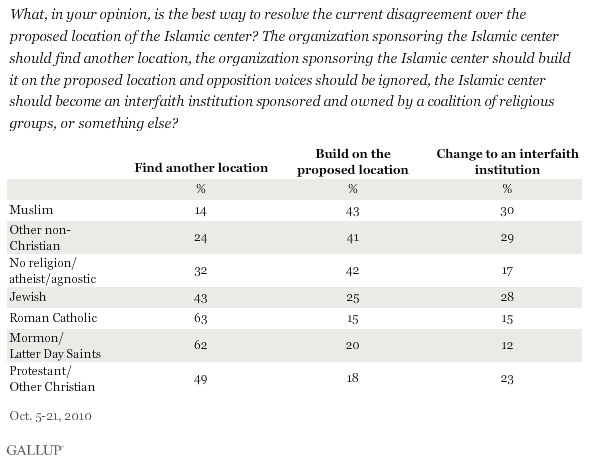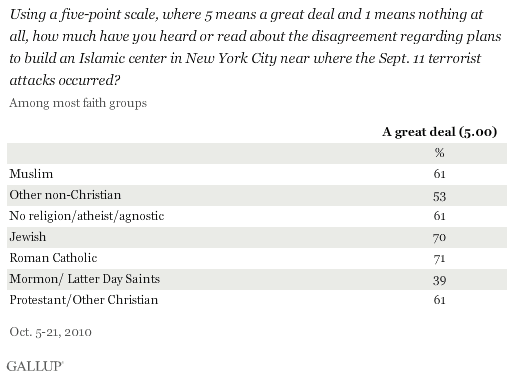WASHINGTON, D.C. -- American faith communities are split on the best way to resolve the disagreement regarding the Islamic center proposed to be built in New York City near the location of the Sept. 11 attacks. Muslims, Jews, other non-Christians and non-religious Americans are more likely to favor retaining the current location as originally conceived, or transforming the center into an interfaith institution. The majority of Catholics, Mormons, and, to a lesser degree, Protestants, believe the center should find another location.

The findings are from a Gallup poll conducted Oct. 5-21, 2010, with 1,729 adults in the United States, including more than 200 respondents in each religious group except "other non-Christian religion." The survey asked respondents their opinion about "the best way to resolve the current disagreement over the proposed location of the Islamic center," providing three options and also allowing them to suggest alternative options.
There are significant differences across faith groups in response to the three options offered in the question wording, and individual faith groups mostly lack a strong consensus on the best path forward.
Approximately 45% of U.S. Muslims, other non-Christians (apart from Muslims and Jews) and atheists/agnostics said the center should move forward with the proposed location, despite opposition voices.
In contrast, the slight majority of Jewish Americans who do not believe the center should relocate are about evenly divided between retaining the current location and turning the center into an interfaith institution owned by a coalition of religious groups.
Those in the largest religious group in the U.S. -- Protestants and other non-Catholic Christians -- are split in their opinions on the center. About half say that the center should find another location, while the rest divide between the interfaith center option, and building the Islamic center on the current location as planned.
A majority of Catholics, the second largest religious group in the U.S., choose the alternative that the center be built in another location.
Members of most faith groups are quite tuned in to the news about the location of the Islamic center. Catholics, Jews, and Protestants are the most likely to have heard a great deal, followed by Muslims, atheists and agnostics, and other non-Christians. Mormons are the least likely to have heard a great deal.

Implications
Specific U.S. faith groups differ in their preferences about the location of the Islamic center set to be built near ground zero in New York City, with the fault line falling roughly between Christian and non-Christian groups. There is also a lack of consensus even within the same faith community as to the best path forward, further complicating efforts to find a solution to the disagreement that will satisfy everyone. This range in views inside a single religious community suggests that the fault line in the public discourse is better drawn -- not between Muslim Americans and the rest, or even between Christians and non-Christians -- but between groups of Americans with differing perspectives on the issue, regardless of faith.
It may seem that the resolution is destined to leave some groups upset and disappointed while accommodating the views of others, but that presumes the public is not open to compromise. In fact, it may be possible to devise solutions that receive at least tepid support from the majority of all faith groups, thus minimizing the perception that one side or the other has "won" or "lost." Further, it is possible that many Americans would accept one of the other choices they do not name as their preferred solution as an acceptable alternative. A narrowing down of potential options may help to hone in on whether a majority of Americans would perhaps support one option over another.
Results are based on telephone interviews with 1,729 adults aged 18 and older from Oct. 5 - 21, 2010. Respondents were randomly chosen from those who agreed to be re-contacted and based on self identified religious affiliation. Respondents were grouped into the following religious groups: Protestant and Other Christian Religion, Roman Catholic, Jewish, Muslim/Islam, Mormon/Latter-Day Saints, Other Non-Christian Religion, No Religion/Atheist/Agnostic. Respondents form Alaska and Hawaii were excluded from the study.
The maximum margin of sampling error for each religious group is as follows: Protestant (±9%), Roman Catholic (±11%), Jewish (±9%), Muslim/Islam (±9%), Mormon/Latter-Day Saints (±9%), Other Christian Religion (±9%), Other Non-Christian Religion (±11%), No Religion/Atheist/Agnostic (±11%).
Interviews are conducted with respondents on landline telephones and cellular phones, with interviews conducted in Spanish for respondents who are primarily Spanish-speaking. Landline respondents are chosen at random within each household on the basis of which member had the most recent birthday.
Samples are weighted by gender, age, race, Hispanic ethnicity, education, region, adults in the household, cell-phone-only status, cell-phone-mostly status, and phone lines. Demographic weighting targets are based on the March 2009 Current Population Survey figures for the aged 18 and older non-institutionalized population living in U.S. telephone households. All reported margins of sampling error include the computed design effects for weighting and sample design. For this study respondents were further weighted based on the religious make-up of the U.S. population in 2010.
In addition to sampling error, question wording and practical difficulties in conducting surveys can introduce error or bias into the findings of public opinion polls.
For more details on Gallup's polling methodology, visit https://www.gallup.com/.
